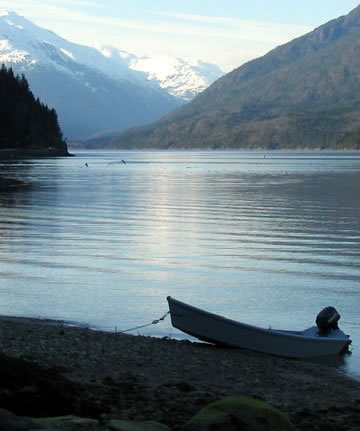
Enbridge Scheme Rejected

Above:
Heiltsuk First Nation demonstrating against Enbridge at Bella Bella on
2 April 2012. |
 |
Chief Snuxyaltwa
(3 April 2012): Today we are facing a battle to save our coast not from
a hurricane, an earthquake or a tsunami but from Enbridge. Even two World
Wars could not kill the Northwest Coast. Our mountains have stopped and
slowed corporate greed for generations. The government has built roads,
cleared most of the forest and exploited the natural environment without
settling Nuxalk land claims. Instead of negotiating treaties with the First
Peoples, the government continues its greed in exploiting our resources.
The Enbridge pipeline will bring tarsands oil to Kitimaat from where
it will be shipped at great risk in huge tankers along the coast. Our
survival as an Indigenous People and our spiritual connection to the
Creator depends on the health of our land and waters. Many of our native
leaders are telling us that we must put our lives on the line to fight
for Mother Earth and the lives of our grandchildren. |
 |
 |
Alanna Andy Gasio (5 April 2012): We
the Nuxalk People, in association with other Coast Salish Nations, have
been struggling for decades to negotiate with the Canadian government
over the control of our hereditary territory rights. Our People are desperately
trying to maintain what remains of our natural resources. Now oil pipelines
and tankers threaten the pristine forest watersheds of our West Coast.
More than can possibly be fathomed, the effect on our resources will
be detrimental. |
Above
and right: Nuxalk Eulachon Project, 2005. Nuxalk heritage sites have
been destroyed and with them disappears the history of our lineage and
our families. I learned first hand about the impact of logging to our
land from my training in archaeology, when I took part in the Nuxalk
Heritage Project. We surveyed land in our outer coastal territory before
it was clearcut logged, locating culturally modified trees and village
sites. At the same time, we witnessed the longterm negative effects of
logging such as slope erosion, destruction of natural water ways, the
impact on plant species and wildlife etc. |
 |